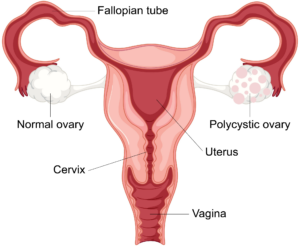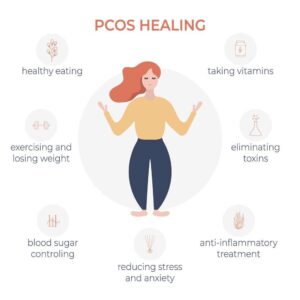Last updated on April 18th, 2025 at 05:08 pm
PCOS Treatment Polycystic Ovary Syndrome (PCOS) is a complex hormonal disorder that affects millions of individuals, especially women of reproductive age. Managing PCOS requires a multifaceted approach that addresses various aspects of the condition. In this article, we delve into PCOS symptoms and treatment, including PCOS treatment for unmarried individuals, dietary strategies, and medication options. Let’s embark on a journey towards understanding and effectively managing PCOS.

PCOS Symptoms
PCOS often presents with a range of symptoms, which can vary in severity among individuals. Common signs of PCOS include irregular periods, excessive hair growth (hirsutism), acne, and weight gain. These symptoms can be distressing, but early recognition is crucial for effective management. Here are the symptoms of PCOS:
- Irregular Menstrual Cycles: One of the hallmark symptoms of PCOS is irregular periods. This can include infrequent menstruation, heavy bleeding, or unpredictable cycles. These irregularities are often caused by hormonal imbalances.
- Excessive Hair Growth (Hirsutism): PCOS can lead to hirsutism, a condition characterized by excessive hair growth in areas where men typically grow hair, such as the face, chest, and back. This occurs due to elevated levels of male hormones called androgens.
- Acne and Oily Skin: Hormonal imbalances in PCOS can trigger acne and excessive oil production on the skin. Managing these skin issues often requires a combination of topical treatments and hormonal regulation.
- Weight Gain and Difficulty Losing Weight: Many individuals with PCOS struggle with weight management. Insulin resistance, a common feature of PCOS, can make it challenging to lose weight, leading to obesity in some cases.
- Fertility Problems: A leading cause of infertility in women is PCOS. Irregular ovulation or the absence of ovulation can make it difficult to conceive. However, fertility treatments are available to help those who wish to start a family.
Approaches to PCOS Treatment
The primary approaches to treatment for PCOS for unmarried are as follows:
1. Lifestyle Modifications
Lifestyle changes are often the first line of defence in managing PCOS. These include:
- Regular Exercise: Engaging in physical activity improves insulin sensitivity, regulates hormones, and aids in weight management.
- Dietary Changes: A balanced diet with an emphasis on whole grains, lean proteins, fruits, and vegetables can help control insulin levels and reduce symptoms.
- Stress Management: Stress reduction techniques such as meditation, yoga, and deep breathing can help balance hormones and alleviate PCOS symptoms.

2. Hormonal Therapy
For individuals with PCOS, hormonal therapy is frequently employed to regulate menstrual cycles and manage symptoms. Common treatments include:
- Birth Control Pills: Oral contraceptives can regulate menstruation and reduce androgen levels, which helps control hirsutism and acne.
- Anti-Androgen Medications: These medications block the effects of androgens and can help reduce hair growth and acne.
3. Insulin-Sensitizing Medications
In cases where there is insulin resistance, some medications like Metformin may be prescribed. These medications improve insulin sensitivity, helping to regulate blood sugar levels and reduce the risk of diabetes.
4. Fertility Treatments
For individuals struggling to conceive due to PCOS-related infertility, fertility treatments like ovulation induction and in vitro fertilization (IVF) may be recommended. These interventions increase the chances of successful pregnancy.
> Consult a doctor and Order Medicine Online
PCOS and Fertility
It’s crucial to understand that PCOS affects each person differently. The symptoms can vary in type and severity, and what works for one individual may not be suitable for another. Therefore, PCOS treatment should be highly individualized and guided by a healthcare provider’s expertise.
One of the significant concerns for unmarried individuals with PCOS is its impact on fertility. It can be challenging to conceive in irregular ovulation. Fortunately, various fertility treatments are available to help those who wish to start a family.

PCOS Treatment for Unmarried Individuals
- Lifestyle Modifications: Lifestyle changes play a pivotal role in managing PCOS, especially for unmarried individuals. Incorporating regular exercise, maintaining a balanced diet, and managing stress can help alleviate symptoms and improve overall well-being.
- Support and Counseling: Dealing with PCOS can be emotionally taxing. Seeking support and counselling can provide invaluable assistance in coping with the condition, managing stress, and building resilience.
Diet
- Balanced Nutrition: A well-balanced diet is essential in PCOS management. Focus on whole grains, lean proteins, fruits, and vegetables. Avoid excessive consumption of processed foods and sugar, as they can exacerbate insulin resistance—a common feature of PCOS.
- Importance of Hydration: Adequate hydration is often underestimated but is crucial in PCOS treatment. Water helps flush poisons from the body and sustains metabolic processes. Aim to drink at least eight glasses of water every day.
Medication
- Hormonal Therapy: Hormonal contraceptives are commonly prescribed to regulate menstrual cycles and manage symptoms like acne and hirsutism. Your healthcare provider will recommend the most suitable option based on your specific needs.
- Insulin-Sensitizing Medications: For individuals with insulin resistance, medications like Metformin may be prescribed to improve insulin sensitivity and regulate blood sugar levels.

PCOS Treatment at Home
- Regular Exercise: Physical activity plays a vital role in controlling PCOS symptoms. Engaging in regular exercise helps improve insulin sensitivity, regulate hormones, and support weight management. Aim for at least 150 minutes of moderate to intensity exercise every week.
- Stress Management: Stress can exacerbate PCOS symptoms. Practice stress-reduction techniques like mindfulness, meditation, or yoga to promote emotional well-being and hormonal balance.
Read: What are Generic Medicines?
Long-term Impact of PCOS
- Risk of Complications: Untreated or poorly managed PCOS can lead to long-term health issues such as diabetes, cardiovascular disease, and endometrial cancer. Regular check-ups and adherence to treatment plans are essential to mitigate these risks.
- Lifelong Management: PCOS is a lifelong condition, but with consistent management, individuals can lead healthy lives. It’s essential to stay informed, work closely with healthcare providers, and adapt your treatment plan as needed.
Embracing a Positive Outlook
- Self-Care and Self-Love: PCOS can challenge self-esteem, but remember that your worth is not defined by this condition. Engage in self-care activities that promote self-love and boost confidence.
- Celebrating Small Victories: Every achievement in managing PCOS, no matter how small, deserves celebration. Recognize your efforts and progress along the way.
The Future of PCOS Treatment
- Ongoing Research: Advancements in medical research continue to shed light on PCOS. Stay informed about new treatment options and emerging therapies by consulting with your healthcare provider and keeping up with the latest developments in the field.
- Advocacy and Awareness: As awareness of PCOS grows, advocacy efforts are gaining momentum. Support organizations and initiatives that aim to improve PCOS diagnosis, treatment, and public understanding.
Conclusion
PCOS is a complex condition that requires a multifaceted approach to treatment. By recognizing its symptoms, implementing lifestyle changes, considering medication options, and prioritizing mental and emotional well-being, individuals with PCOS can lead fulfilling lives. Remember that you are not alone in your PCOS journey, and seeking support from healthcare professionals, loved ones, and the PCOS community can make a significant difference.
Embrace a positive outlook, stay informed, and never underestimate the power of self-care in managing PCOS effectively. The future holds promise for continued advancements in PCOS treatment, giving hope to those affected by this condition.
FAQs on PCOS Treatment
Q.1 What is PCOS treatment?
PCOS treatment involves a multifaceted approach that includes lifestyle modifications like exercise and dietary changes to manage symptoms. Hormonal therapy, such as birth control pills and anti-androgen medications, can help regulate menstrual cycles and control hirsutism and acne. Doctors may prescribe insulin-sensitizing medications to treat insulin resistance, while fertility treatments can help those struggling with infertility due to PCOS.
Q.2 Can PCOS be Cured?
PCOS cannot be completely cured, but its symptoms can be effectively managed through lifestyle changes and medical interventions.
Q.3 Is PCOS Treatment Effective for Everyone?
The effectiveness of PCOS treatment can vary from person to person. It’s essential to work closely with a healthcare provider to find the right approach for your individual needs.
Q.4 Can Unmarried Individuals with PCOS Have Children?
Yes, with the appropriate medical interventions and fertility treatments, unmarried individuals with PCOS can conceive and have children.
Related Links: